Leadership Approach: A Critical Analysis of Character, Ethics & Values
VerifiedAdded on 2023/06/14
|13
|3941
|317
Essay
AI Summary
This essay critically analyzes the concept of leadership, emphasizing the significance of character, ethics, values, and beliefs. It explores how a leader should reflect and engage with these ideas in their leadership approach, addressing the challenges and consequences of implementing such concepts in organizational settings. The discussion covers the definition and nature of character, ethical and value dimensions, and relevant leadership theories, supported by practical examples. It highlights the importance of trustworthy leaders who command respect, encourage their teams, and identify issues. Ethical leadership is examined, focusing on transparency, integrity, and consistency. The analysis includes examples from leaders like Dave Lewis of Tesco and the founders of Google, illustrating the application of leadership theories in real-world scenarios. The essay concludes by summarizing the key aspects of character, ethics, and values in effective leadership.
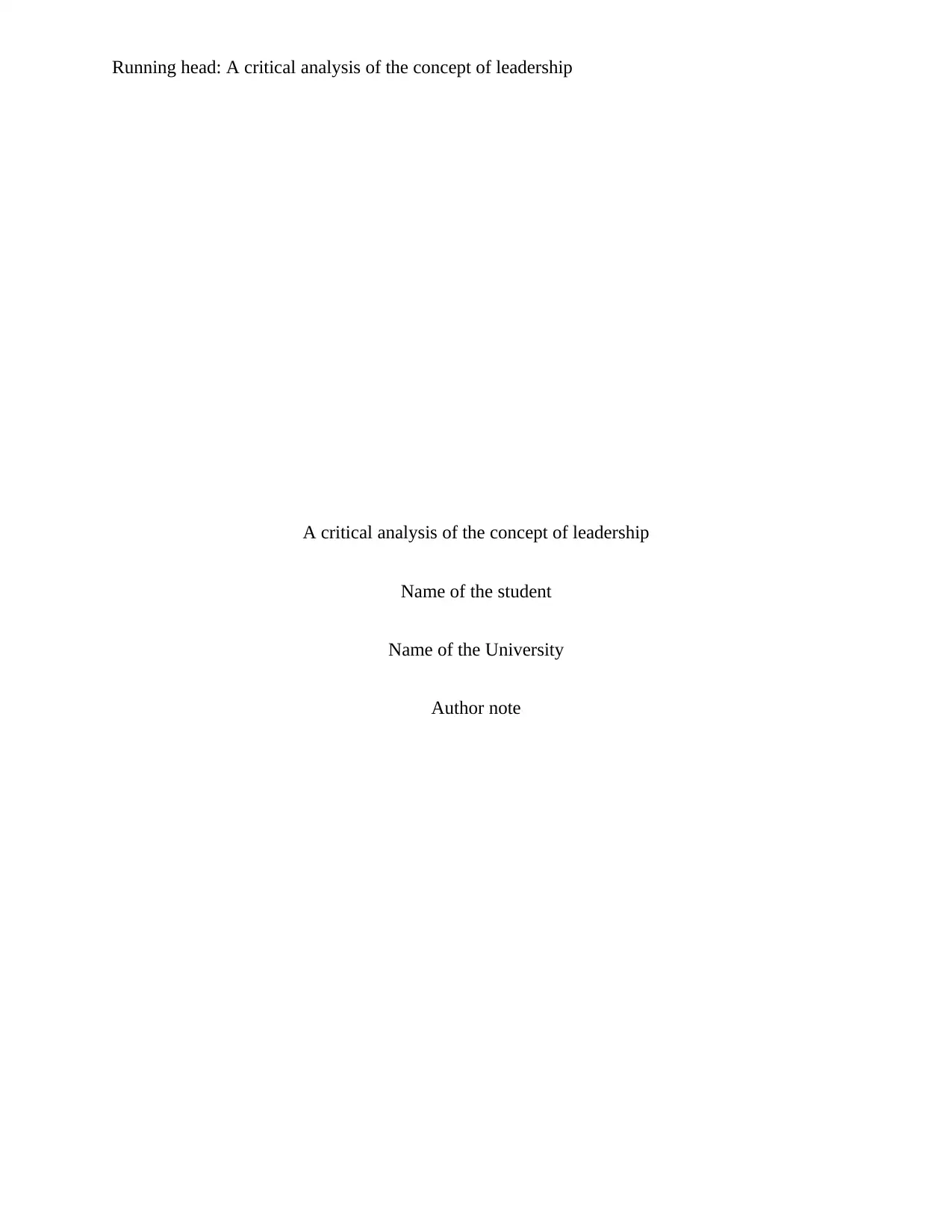
Running head: A critical analysis of the concept of leadership
A critical analysis of the concept of leadership
Name of the student
Name of the University
Author note
A critical analysis of the concept of leadership
Name of the student
Name of the University
Author note
Paraphrase This Document
Need a fresh take? Get an instant paraphrase of this document with our AI Paraphraser
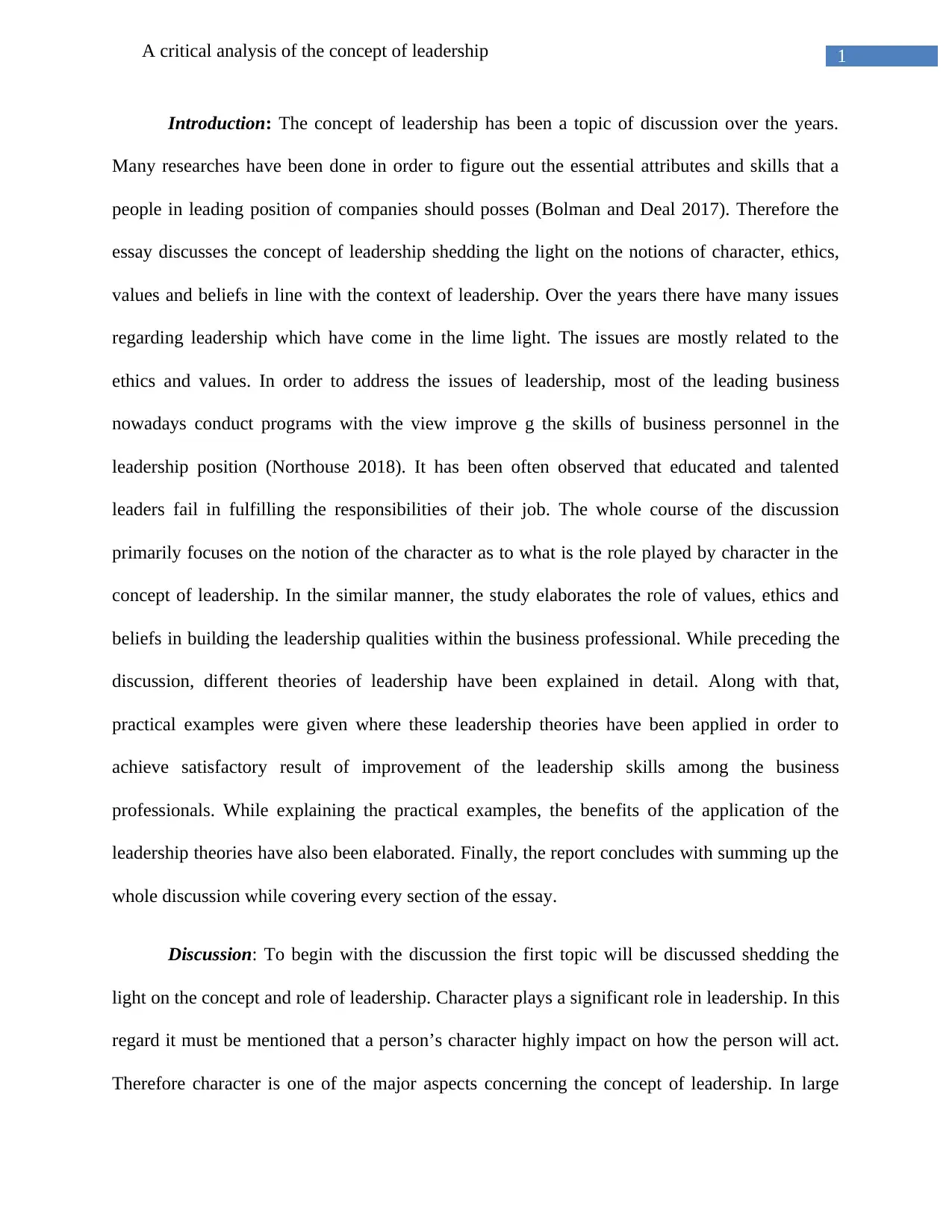
1A critical analysis of the concept of leadership
Introduction: The concept of leadership has been a topic of discussion over the years.
Many researches have been done in order to figure out the essential attributes and skills that a
people in leading position of companies should posses (Bolman and Deal 2017). Therefore the
essay discusses the concept of leadership shedding the light on the notions of character, ethics,
values and beliefs in line with the context of leadership. Over the years there have many issues
regarding leadership which have come in the lime light. The issues are mostly related to the
ethics and values. In order to address the issues of leadership, most of the leading business
nowadays conduct programs with the view improve g the skills of business personnel in the
leadership position (Northouse 2018). It has been often observed that educated and talented
leaders fail in fulfilling the responsibilities of their job. The whole course of the discussion
primarily focuses on the notion of the character as to what is the role played by character in the
concept of leadership. In the similar manner, the study elaborates the role of values, ethics and
beliefs in building the leadership qualities within the business professional. While preceding the
discussion, different theories of leadership have been explained in detail. Along with that,
practical examples were given where these leadership theories have been applied in order to
achieve satisfactory result of improvement of the leadership skills among the business
professionals. While explaining the practical examples, the benefits of the application of the
leadership theories have also been elaborated. Finally, the report concludes with summing up the
whole discussion while covering every section of the essay.
Discussion: To begin with the discussion the first topic will be discussed shedding the
light on the concept and role of leadership. Character plays a significant role in leadership. In this
regard it must be mentioned that a person’s character highly impact on how the person will act.
Therefore character is one of the major aspects concerning the concept of leadership. In large
Introduction: The concept of leadership has been a topic of discussion over the years.
Many researches have been done in order to figure out the essential attributes and skills that a
people in leading position of companies should posses (Bolman and Deal 2017). Therefore the
essay discusses the concept of leadership shedding the light on the notions of character, ethics,
values and beliefs in line with the context of leadership. Over the years there have many issues
regarding leadership which have come in the lime light. The issues are mostly related to the
ethics and values. In order to address the issues of leadership, most of the leading business
nowadays conduct programs with the view improve g the skills of business personnel in the
leadership position (Northouse 2018). It has been often observed that educated and talented
leaders fail in fulfilling the responsibilities of their job. The whole course of the discussion
primarily focuses on the notion of the character as to what is the role played by character in the
concept of leadership. In the similar manner, the study elaborates the role of values, ethics and
beliefs in building the leadership qualities within the business professional. While preceding the
discussion, different theories of leadership have been explained in detail. Along with that,
practical examples were given where these leadership theories have been applied in order to
achieve satisfactory result of improvement of the leadership skills among the business
professionals. While explaining the practical examples, the benefits of the application of the
leadership theories have also been elaborated. Finally, the report concludes with summing up the
whole discussion while covering every section of the essay.
Discussion: To begin with the discussion the first topic will be discussed shedding the
light on the concept and role of leadership. Character plays a significant role in leadership. In this
regard it must be mentioned that a person’s character highly impact on how the person will act.
Therefore character is one of the major aspects concerning the concept of leadership. In large
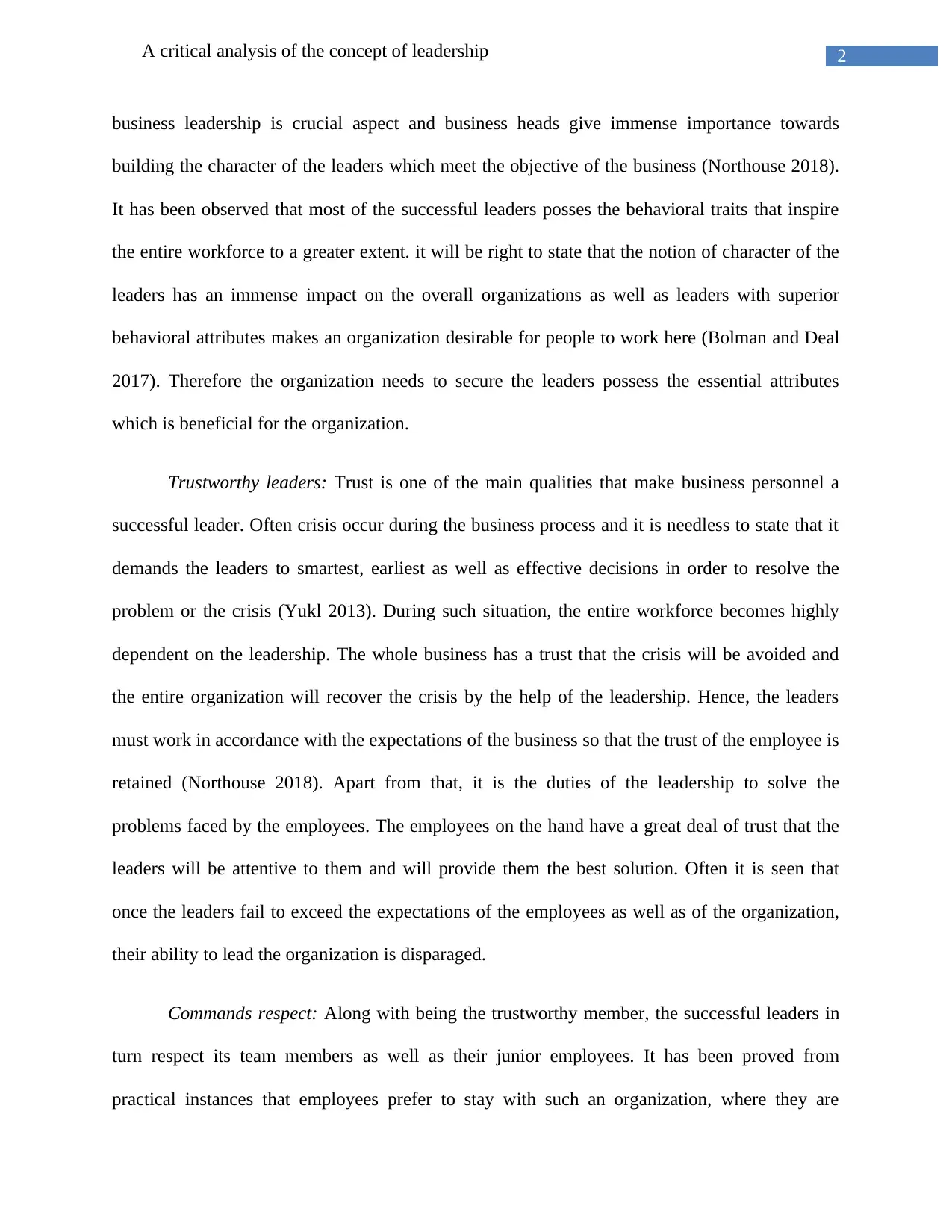
2A critical analysis of the concept of leadership
business leadership is crucial aspect and business heads give immense importance towards
building the character of the leaders which meet the objective of the business (Northouse 2018).
It has been observed that most of the successful leaders posses the behavioral traits that inspire
the entire workforce to a greater extent. it will be right to state that the notion of character of the
leaders has an immense impact on the overall organizations as well as leaders with superior
behavioral attributes makes an organization desirable for people to work here (Bolman and Deal
2017). Therefore the organization needs to secure the leaders possess the essential attributes
which is beneficial for the organization.
Trustworthy leaders: Trust is one of the main qualities that make business personnel a
successful leader. Often crisis occur during the business process and it is needless to state that it
demands the leaders to smartest, earliest as well as effective decisions in order to resolve the
problem or the crisis (Yukl 2013). During such situation, the entire workforce becomes highly
dependent on the leadership. The whole business has a trust that the crisis will be avoided and
the entire organization will recover the crisis by the help of the leadership. Hence, the leaders
must work in accordance with the expectations of the business so that the trust of the employee is
retained (Northouse 2018). Apart from that, it is the duties of the leadership to solve the
problems faced by the employees. The employees on the hand have a great deal of trust that the
leaders will be attentive to them and will provide them the best solution. Often it is seen that
once the leaders fail to exceed the expectations of the employees as well as of the organization,
their ability to lead the organization is disparaged.
Commands respect: Along with being the trustworthy member, the successful leaders in
turn respect its team members as well as their junior employees. It has been proved from
practical instances that employees prefer to stay with such an organization, where they are
business leadership is crucial aspect and business heads give immense importance towards
building the character of the leaders which meet the objective of the business (Northouse 2018).
It has been observed that most of the successful leaders posses the behavioral traits that inspire
the entire workforce to a greater extent. it will be right to state that the notion of character of the
leaders has an immense impact on the overall organizations as well as leaders with superior
behavioral attributes makes an organization desirable for people to work here (Bolman and Deal
2017). Therefore the organization needs to secure the leaders possess the essential attributes
which is beneficial for the organization.
Trustworthy leaders: Trust is one of the main qualities that make business personnel a
successful leader. Often crisis occur during the business process and it is needless to state that it
demands the leaders to smartest, earliest as well as effective decisions in order to resolve the
problem or the crisis (Yukl 2013). During such situation, the entire workforce becomes highly
dependent on the leadership. The whole business has a trust that the crisis will be avoided and
the entire organization will recover the crisis by the help of the leadership. Hence, the leaders
must work in accordance with the expectations of the business so that the trust of the employee is
retained (Northouse 2018). Apart from that, it is the duties of the leadership to solve the
problems faced by the employees. The employees on the hand have a great deal of trust that the
leaders will be attentive to them and will provide them the best solution. Often it is seen that
once the leaders fail to exceed the expectations of the employees as well as of the organization,
their ability to lead the organization is disparaged.
Commands respect: Along with being the trustworthy member, the successful leaders in
turn respect its team members as well as their junior employees. It has been proved from
practical instances that employees prefer to stay with such an organization, where they are
⊘ This is a preview!⊘
Do you want full access?
Subscribe today to unlock all pages.

Trusted by 1+ million students worldwide
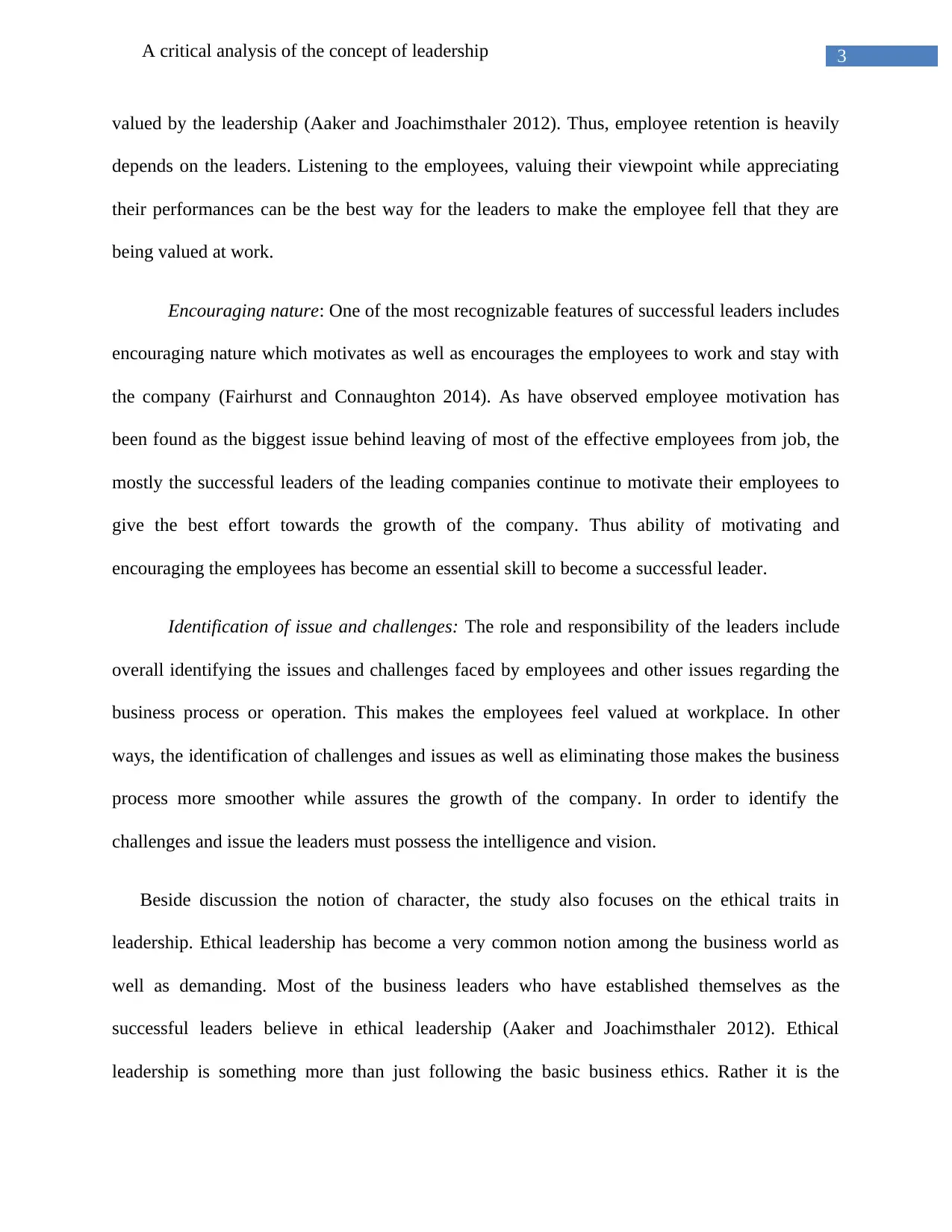
3A critical analysis of the concept of leadership
valued by the leadership (Aaker and Joachimsthaler 2012). Thus, employee retention is heavily
depends on the leaders. Listening to the employees, valuing their viewpoint while appreciating
their performances can be the best way for the leaders to make the employee fell that they are
being valued at work.
Encouraging nature: One of the most recognizable features of successful leaders includes
encouraging nature which motivates as well as encourages the employees to work and stay with
the company (Fairhurst and Connaughton 2014). As have observed employee motivation has
been found as the biggest issue behind leaving of most of the effective employees from job, the
mostly the successful leaders of the leading companies continue to motivate their employees to
give the best effort towards the growth of the company. Thus ability of motivating and
encouraging the employees has become an essential skill to become a successful leader.
Identification of issue and challenges: The role and responsibility of the leaders include
overall identifying the issues and challenges faced by employees and other issues regarding the
business process or operation. This makes the employees feel valued at workplace. In other
ways, the identification of challenges and issues as well as eliminating those makes the business
process more smoother while assures the growth of the company. In order to identify the
challenges and issue the leaders must possess the intelligence and vision.
Beside discussion the notion of character, the study also focuses on the ethical traits in
leadership. Ethical leadership has become a very common notion among the business world as
well as demanding. Most of the business leaders who have established themselves as the
successful leaders believe in ethical leadership (Aaker and Joachimsthaler 2012). Ethical
leadership is something more than just following the basic business ethics. Rather it is the
valued by the leadership (Aaker and Joachimsthaler 2012). Thus, employee retention is heavily
depends on the leaders. Listening to the employees, valuing their viewpoint while appreciating
their performances can be the best way for the leaders to make the employee fell that they are
being valued at work.
Encouraging nature: One of the most recognizable features of successful leaders includes
encouraging nature which motivates as well as encourages the employees to work and stay with
the company (Fairhurst and Connaughton 2014). As have observed employee motivation has
been found as the biggest issue behind leaving of most of the effective employees from job, the
mostly the successful leaders of the leading companies continue to motivate their employees to
give the best effort towards the growth of the company. Thus ability of motivating and
encouraging the employees has become an essential skill to become a successful leader.
Identification of issue and challenges: The role and responsibility of the leaders include
overall identifying the issues and challenges faced by employees and other issues regarding the
business process or operation. This makes the employees feel valued at workplace. In other
ways, the identification of challenges and issues as well as eliminating those makes the business
process more smoother while assures the growth of the company. In order to identify the
challenges and issue the leaders must possess the intelligence and vision.
Beside discussion the notion of character, the study also focuses on the ethical traits in
leadership. Ethical leadership has become a very common notion among the business world as
well as demanding. Most of the business leaders who have established themselves as the
successful leaders believe in ethical leadership (Aaker and Joachimsthaler 2012). Ethical
leadership is something more than just following the basic business ethics. Rather it is the
Paraphrase This Document
Need a fresh take? Get an instant paraphrase of this document with our AI Paraphraser
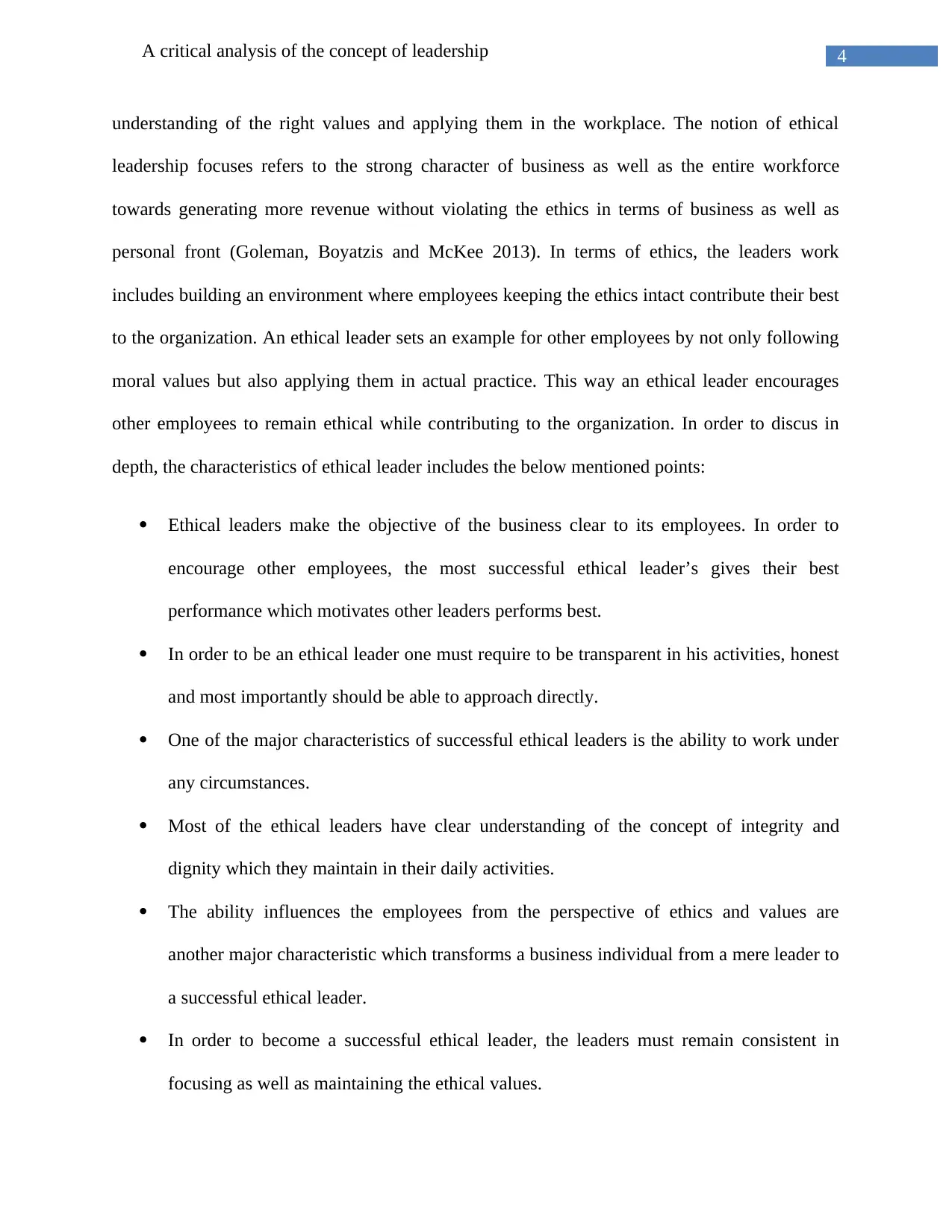
4A critical analysis of the concept of leadership
understanding of the right values and applying them in the workplace. The notion of ethical
leadership focuses refers to the strong character of business as well as the entire workforce
towards generating more revenue without violating the ethics in terms of business as well as
personal front (Goleman, Boyatzis and McKee 2013). In terms of ethics, the leaders work
includes building an environment where employees keeping the ethics intact contribute their best
to the organization. An ethical leader sets an example for other employees by not only following
moral values but also applying them in actual practice. This way an ethical leader encourages
other employees to remain ethical while contributing to the organization. In order to discus in
depth, the characteristics of ethical leader includes the below mentioned points:
Ethical leaders make the objective of the business clear to its employees. In order to
encourage other employees, the most successful ethical leader’s gives their best
performance which motivates other leaders performs best.
In order to be an ethical leader one must require to be transparent in his activities, honest
and most importantly should be able to approach directly.
One of the major characteristics of successful ethical leaders is the ability to work under
any circumstances.
Most of the ethical leaders have clear understanding of the concept of integrity and
dignity which they maintain in their daily activities.
The ability influences the employees from the perspective of ethics and values are
another major characteristic which transforms a business individual from a mere leader to
a successful ethical leader.
In order to become a successful ethical leader, the leaders must remain consistent in
focusing as well as maintaining the ethical values.
understanding of the right values and applying them in the workplace. The notion of ethical
leadership focuses refers to the strong character of business as well as the entire workforce
towards generating more revenue without violating the ethics in terms of business as well as
personal front (Goleman, Boyatzis and McKee 2013). In terms of ethics, the leaders work
includes building an environment where employees keeping the ethics intact contribute their best
to the organization. An ethical leader sets an example for other employees by not only following
moral values but also applying them in actual practice. This way an ethical leader encourages
other employees to remain ethical while contributing to the organization. In order to discus in
depth, the characteristics of ethical leader includes the below mentioned points:
Ethical leaders make the objective of the business clear to its employees. In order to
encourage other employees, the most successful ethical leader’s gives their best
performance which motivates other leaders performs best.
In order to be an ethical leader one must require to be transparent in his activities, honest
and most importantly should be able to approach directly.
One of the major characteristics of successful ethical leaders is the ability to work under
any circumstances.
Most of the ethical leaders have clear understanding of the concept of integrity and
dignity which they maintain in their daily activities.
The ability influences the employees from the perspective of ethics and values are
another major characteristic which transforms a business individual from a mere leader to
a successful ethical leader.
In order to become a successful ethical leader, the leaders must remain consistent in
focusing as well as maintaining the ethical values.
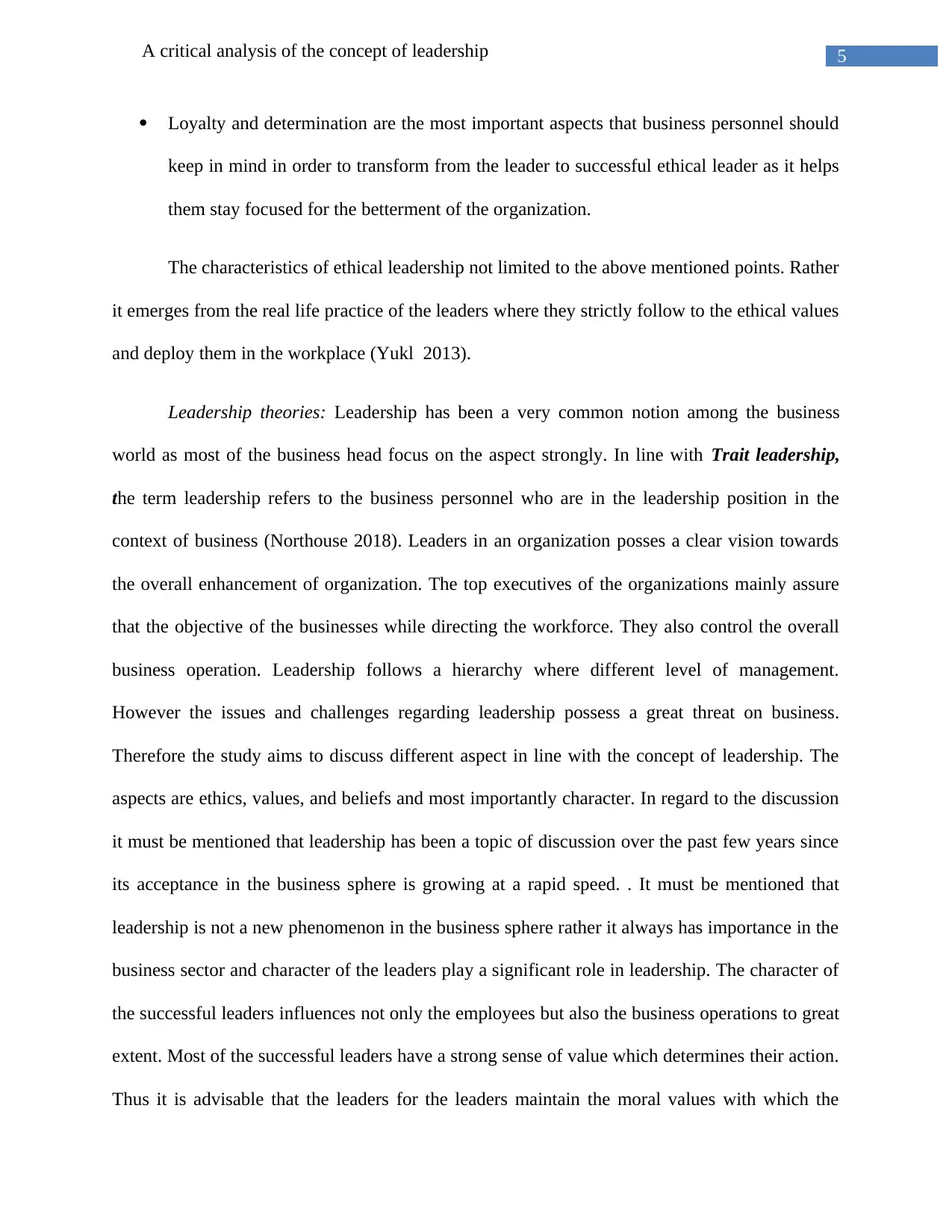
5A critical analysis of the concept of leadership
Loyalty and determination are the most important aspects that business personnel should
keep in mind in order to transform from the leader to successful ethical leader as it helps
them stay focused for the betterment of the organization.
The characteristics of ethical leadership not limited to the above mentioned points. Rather
it emerges from the real life practice of the leaders where they strictly follow to the ethical values
and deploy them in the workplace (Yukl 2013).
Leadership theories: Leadership has been a very common notion among the business
world as most of the business head focus on the aspect strongly. In line with Trait leadership,
the term leadership refers to the business personnel who are in the leadership position in the
context of business (Northouse 2018). Leaders in an organization posses a clear vision towards
the overall enhancement of organization. The top executives of the organizations mainly assure
that the objective of the businesses while directing the workforce. They also control the overall
business operation. Leadership follows a hierarchy where different level of management.
However the issues and challenges regarding leadership possess a great threat on business.
Therefore the study aims to discuss different aspect in line with the concept of leadership. The
aspects are ethics, values, and beliefs and most importantly character. In regard to the discussion
it must be mentioned that leadership has been a topic of discussion over the past few years since
its acceptance in the business sphere is growing at a rapid speed. . It must be mentioned that
leadership is not a new phenomenon in the business sphere rather it always has importance in the
business sector and character of the leaders play a significant role in leadership. The character of
the successful leaders influences not only the employees but also the business operations to great
extent. Most of the successful leaders have a strong sense of value which determines their action.
Thus it is advisable that the leaders for the leaders maintain the moral values with which the
Loyalty and determination are the most important aspects that business personnel should
keep in mind in order to transform from the leader to successful ethical leader as it helps
them stay focused for the betterment of the organization.
The characteristics of ethical leadership not limited to the above mentioned points. Rather
it emerges from the real life practice of the leaders where they strictly follow to the ethical values
and deploy them in the workplace (Yukl 2013).
Leadership theories: Leadership has been a very common notion among the business
world as most of the business head focus on the aspect strongly. In line with Trait leadership,
the term leadership refers to the business personnel who are in the leadership position in the
context of business (Northouse 2018). Leaders in an organization posses a clear vision towards
the overall enhancement of organization. The top executives of the organizations mainly assure
that the objective of the businesses while directing the workforce. They also control the overall
business operation. Leadership follows a hierarchy where different level of management.
However the issues and challenges regarding leadership possess a great threat on business.
Therefore the study aims to discuss different aspect in line with the concept of leadership. The
aspects are ethics, values, and beliefs and most importantly character. In regard to the discussion
it must be mentioned that leadership has been a topic of discussion over the past few years since
its acceptance in the business sphere is growing at a rapid speed. . It must be mentioned that
leadership is not a new phenomenon in the business sphere rather it always has importance in the
business sector and character of the leaders play a significant role in leadership. The character of
the successful leaders influences not only the employees but also the business operations to great
extent. Most of the successful leaders have a strong sense of value which determines their action.
Thus it is advisable that the leaders for the leaders maintain the moral values with which the
⊘ This is a preview!⊘
Do you want full access?
Subscribe today to unlock all pages.

Trusted by 1+ million students worldwide
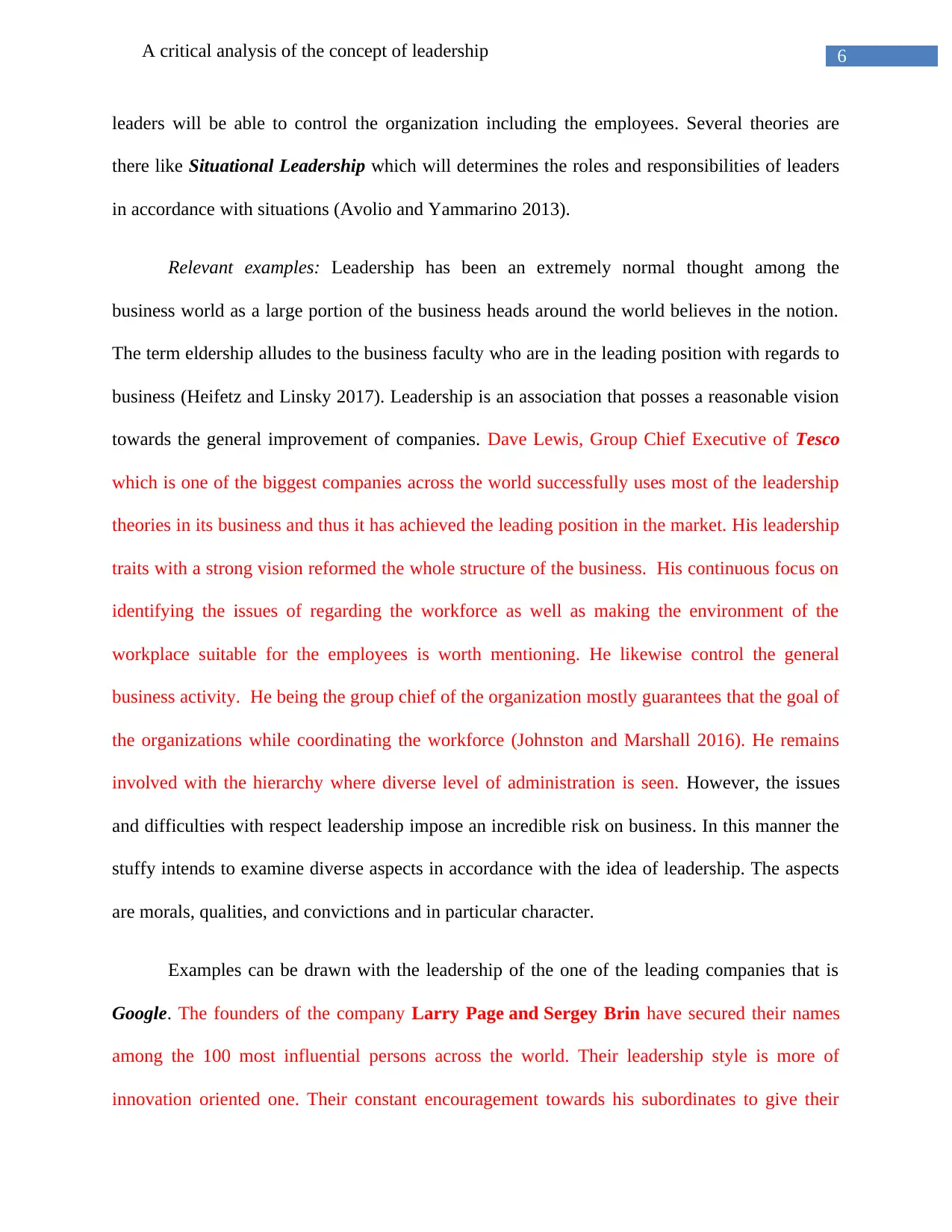
6A critical analysis of the concept of leadership
leaders will be able to control the organization including the employees. Several theories are
there like Situational Leadership which will determines the roles and responsibilities of leaders
in accordance with situations (Avolio and Yammarino 2013).
Relevant examples: Leadership has been an extremely normal thought among the
business world as a large portion of the business heads around the world believes in the notion.
The term eldership alludes to the business faculty who are in the leading position with regards to
business (Heifetz and Linsky 2017). Leadership is an association that posses a reasonable vision
towards the general improvement of companies. Dave Lewis, Group Chief Executive of Tesco
which is one of the biggest companies across the world successfully uses most of the leadership
theories in its business and thus it has achieved the leading position in the market. His leadership
traits with a strong vision reformed the whole structure of the business. His continuous focus on
identifying the issues of regarding the workforce as well as making the environment of the
workplace suitable for the employees is worth mentioning. He likewise control the general
business activity. He being the group chief of the organization mostly guarantees that the goal of
the organizations while coordinating the workforce (Johnston and Marshall 2016). He remains
involved with the hierarchy where diverse level of administration is seen. However, the issues
and difficulties with respect leadership impose an incredible risk on business. In this manner the
stuffy intends to examine diverse aspects in accordance with the idea of leadership. The aspects
are morals, qualities, and convictions and in particular character.
Examples can be drawn with the leadership of the one of the leading companies that is
Google. The founders of the company Larry Page and Sergey Brin have secured their names
among the 100 most influential persons across the world. Their leadership style is more of
innovation oriented one. Their constant encouragement towards his subordinates to give their
leaders will be able to control the organization including the employees. Several theories are
there like Situational Leadership which will determines the roles and responsibilities of leaders
in accordance with situations (Avolio and Yammarino 2013).
Relevant examples: Leadership has been an extremely normal thought among the
business world as a large portion of the business heads around the world believes in the notion.
The term eldership alludes to the business faculty who are in the leading position with regards to
business (Heifetz and Linsky 2017). Leadership is an association that posses a reasonable vision
towards the general improvement of companies. Dave Lewis, Group Chief Executive of Tesco
which is one of the biggest companies across the world successfully uses most of the leadership
theories in its business and thus it has achieved the leading position in the market. His leadership
traits with a strong vision reformed the whole structure of the business. His continuous focus on
identifying the issues of regarding the workforce as well as making the environment of the
workplace suitable for the employees is worth mentioning. He likewise control the general
business activity. He being the group chief of the organization mostly guarantees that the goal of
the organizations while coordinating the workforce (Johnston and Marshall 2016). He remains
involved with the hierarchy where diverse level of administration is seen. However, the issues
and difficulties with respect leadership impose an incredible risk on business. In this manner the
stuffy intends to examine diverse aspects in accordance with the idea of leadership. The aspects
are morals, qualities, and convictions and in particular character.
Examples can be drawn with the leadership of the one of the leading companies that is
Google. The founders of the company Larry Page and Sergey Brin have secured their names
among the 100 most influential persons across the world. Their leadership style is more of
innovation oriented one. Their constant encouragement towards his subordinates to give their
Paraphrase This Document
Need a fresh take? Get an instant paraphrase of this document with our AI Paraphraser
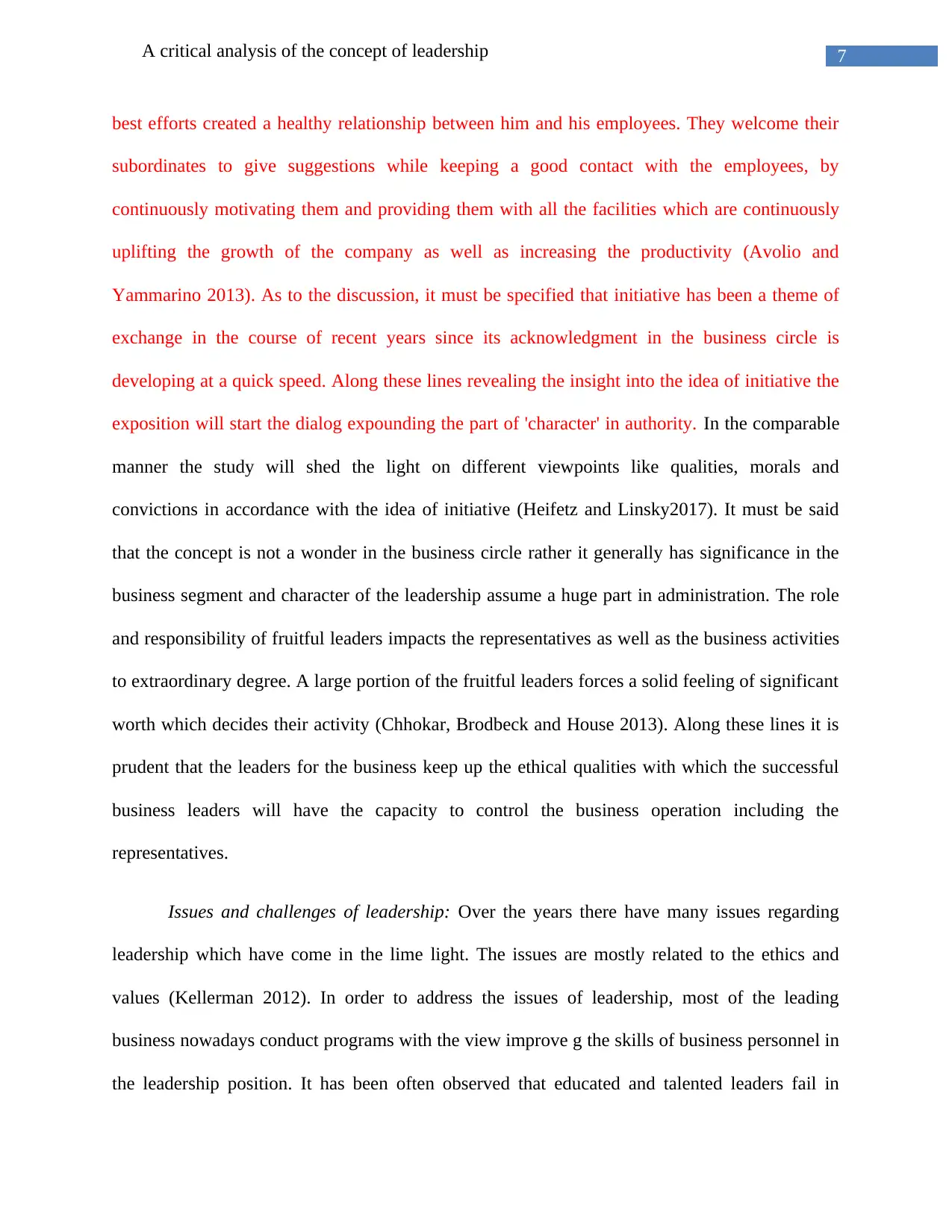
7A critical analysis of the concept of leadership
best efforts created a healthy relationship between him and his employees. They welcome their
subordinates to give suggestions while keeping a good contact with the employees, by
continuously motivating them and providing them with all the facilities which are continuously
uplifting the growth of the company as well as increasing the productivity (Avolio and
Yammarino 2013). As to the discussion, it must be specified that initiative has been a theme of
exchange in the course of recent years since its acknowledgment in the business circle is
developing at a quick speed. Along these lines revealing the insight into the idea of initiative the
exposition will start the dialog expounding the part of 'character' in authority. In the comparable
manner the study will shed the light on different viewpoints like qualities, morals and
convictions in accordance with the idea of initiative (Heifetz and Linsky2017). It must be said
that the concept is not a wonder in the business circle rather it generally has significance in the
business segment and character of the leadership assume a huge part in administration. The role
and responsibility of fruitful leaders impacts the representatives as well as the business activities
to extraordinary degree. A large portion of the fruitful leaders forces a solid feeling of significant
worth which decides their activity (Chhokar, Brodbeck and House 2013). Along these lines it is
prudent that the leaders for the business keep up the ethical qualities with which the successful
business leaders will have the capacity to control the business operation including the
representatives.
Issues and challenges of leadership: Over the years there have many issues regarding
leadership which have come in the lime light. The issues are mostly related to the ethics and
values (Kellerman 2012). In order to address the issues of leadership, most of the leading
business nowadays conduct programs with the view improve g the skills of business personnel in
the leadership position. It has been often observed that educated and talented leaders fail in
best efforts created a healthy relationship between him and his employees. They welcome their
subordinates to give suggestions while keeping a good contact with the employees, by
continuously motivating them and providing them with all the facilities which are continuously
uplifting the growth of the company as well as increasing the productivity (Avolio and
Yammarino 2013). As to the discussion, it must be specified that initiative has been a theme of
exchange in the course of recent years since its acknowledgment in the business circle is
developing at a quick speed. Along these lines revealing the insight into the idea of initiative the
exposition will start the dialog expounding the part of 'character' in authority. In the comparable
manner the study will shed the light on different viewpoints like qualities, morals and
convictions in accordance with the idea of initiative (Heifetz and Linsky2017). It must be said
that the concept is not a wonder in the business circle rather it generally has significance in the
business segment and character of the leadership assume a huge part in administration. The role
and responsibility of fruitful leaders impacts the representatives as well as the business activities
to extraordinary degree. A large portion of the fruitful leaders forces a solid feeling of significant
worth which decides their activity (Chhokar, Brodbeck and House 2013). Along these lines it is
prudent that the leaders for the business keep up the ethical qualities with which the successful
business leaders will have the capacity to control the business operation including the
representatives.
Issues and challenges of leadership: Over the years there have many issues regarding
leadership which have come in the lime light. The issues are mostly related to the ethics and
values (Kellerman 2012). In order to address the issues of leadership, most of the leading
business nowadays conduct programs with the view improve g the skills of business personnel in
the leadership position. It has been often observed that educated and talented leaders fail in
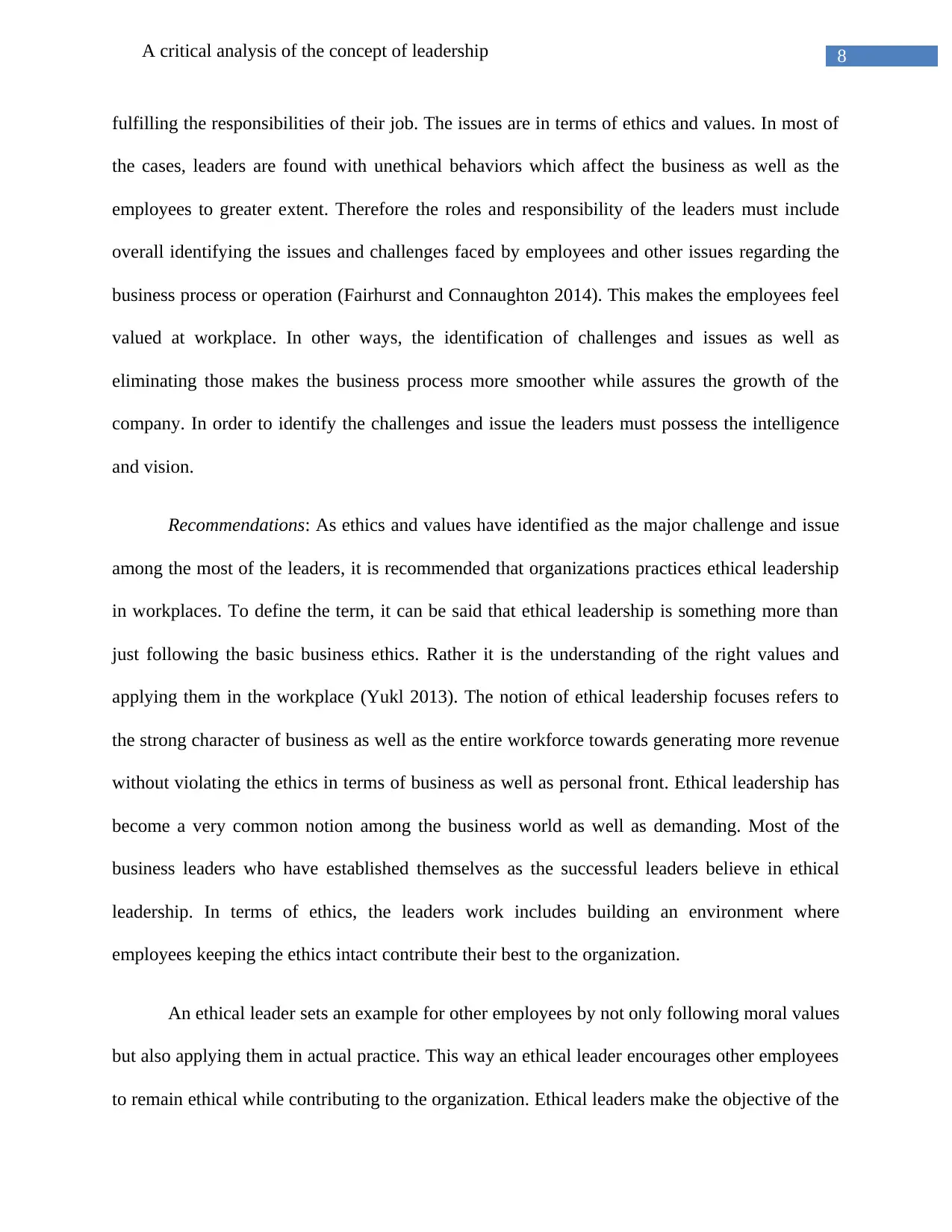
8A critical analysis of the concept of leadership
fulfilling the responsibilities of their job. The issues are in terms of ethics and values. In most of
the cases, leaders are found with unethical behaviors which affect the business as well as the
employees to greater extent. Therefore the roles and responsibility of the leaders must include
overall identifying the issues and challenges faced by employees and other issues regarding the
business process or operation (Fairhurst and Connaughton 2014). This makes the employees feel
valued at workplace. In other ways, the identification of challenges and issues as well as
eliminating those makes the business process more smoother while assures the growth of the
company. In order to identify the challenges and issue the leaders must possess the intelligence
and vision.
Recommendations: As ethics and values have identified as the major challenge and issue
among the most of the leaders, it is recommended that organizations practices ethical leadership
in workplaces. To define the term, it can be said that ethical leadership is something more than
just following the basic business ethics. Rather it is the understanding of the right values and
applying them in the workplace (Yukl 2013). The notion of ethical leadership focuses refers to
the strong character of business as well as the entire workforce towards generating more revenue
without violating the ethics in terms of business as well as personal front. Ethical leadership has
become a very common notion among the business world as well as demanding. Most of the
business leaders who have established themselves as the successful leaders believe in ethical
leadership. In terms of ethics, the leaders work includes building an environment where
employees keeping the ethics intact contribute their best to the organization.
An ethical leader sets an example for other employees by not only following moral values
but also applying them in actual practice. This way an ethical leader encourages other employees
to remain ethical while contributing to the organization. Ethical leaders make the objective of the
fulfilling the responsibilities of their job. The issues are in terms of ethics and values. In most of
the cases, leaders are found with unethical behaviors which affect the business as well as the
employees to greater extent. Therefore the roles and responsibility of the leaders must include
overall identifying the issues and challenges faced by employees and other issues regarding the
business process or operation (Fairhurst and Connaughton 2014). This makes the employees feel
valued at workplace. In other ways, the identification of challenges and issues as well as
eliminating those makes the business process more smoother while assures the growth of the
company. In order to identify the challenges and issue the leaders must possess the intelligence
and vision.
Recommendations: As ethics and values have identified as the major challenge and issue
among the most of the leaders, it is recommended that organizations practices ethical leadership
in workplaces. To define the term, it can be said that ethical leadership is something more than
just following the basic business ethics. Rather it is the understanding of the right values and
applying them in the workplace (Yukl 2013). The notion of ethical leadership focuses refers to
the strong character of business as well as the entire workforce towards generating more revenue
without violating the ethics in terms of business as well as personal front. Ethical leadership has
become a very common notion among the business world as well as demanding. Most of the
business leaders who have established themselves as the successful leaders believe in ethical
leadership. In terms of ethics, the leaders work includes building an environment where
employees keeping the ethics intact contribute their best to the organization.
An ethical leader sets an example for other employees by not only following moral values
but also applying them in actual practice. This way an ethical leader encourages other employees
to remain ethical while contributing to the organization. Ethical leaders make the objective of the
⊘ This is a preview!⊘
Do you want full access?
Subscribe today to unlock all pages.

Trusted by 1+ million students worldwide
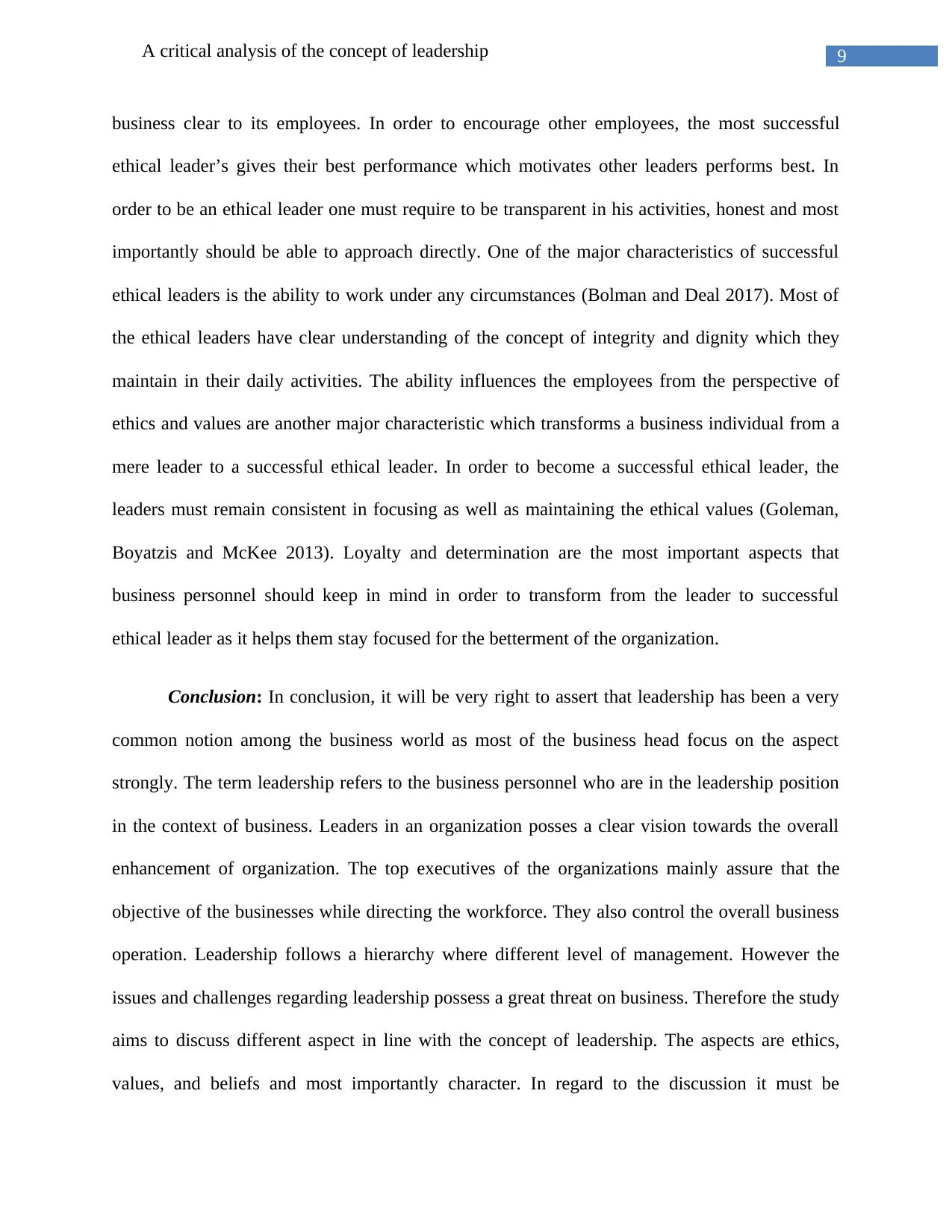
9A critical analysis of the concept of leadership
business clear to its employees. In order to encourage other employees, the most successful
ethical leader’s gives their best performance which motivates other leaders performs best. In
order to be an ethical leader one must require to be transparent in his activities, honest and most
importantly should be able to approach directly. One of the major characteristics of successful
ethical leaders is the ability to work under any circumstances (Bolman and Deal 2017). Most of
the ethical leaders have clear understanding of the concept of integrity and dignity which they
maintain in their daily activities. The ability influences the employees from the perspective of
ethics and values are another major characteristic which transforms a business individual from a
mere leader to a successful ethical leader. In order to become a successful ethical leader, the
leaders must remain consistent in focusing as well as maintaining the ethical values (Goleman,
Boyatzis and McKee 2013). Loyalty and determination are the most important aspects that
business personnel should keep in mind in order to transform from the leader to successful
ethical leader as it helps them stay focused for the betterment of the organization.
Conclusion: In conclusion, it will be very right to assert that leadership has been a very
common notion among the business world as most of the business head focus on the aspect
strongly. The term leadership refers to the business personnel who are in the leadership position
in the context of business. Leaders in an organization posses a clear vision towards the overall
enhancement of organization. The top executives of the organizations mainly assure that the
objective of the businesses while directing the workforce. They also control the overall business
operation. Leadership follows a hierarchy where different level of management. However the
issues and challenges regarding leadership possess a great threat on business. Therefore the study
aims to discuss different aspect in line with the concept of leadership. The aspects are ethics,
values, and beliefs and most importantly character. In regard to the discussion it must be
business clear to its employees. In order to encourage other employees, the most successful
ethical leader’s gives their best performance which motivates other leaders performs best. In
order to be an ethical leader one must require to be transparent in his activities, honest and most
importantly should be able to approach directly. One of the major characteristics of successful
ethical leaders is the ability to work under any circumstances (Bolman and Deal 2017). Most of
the ethical leaders have clear understanding of the concept of integrity and dignity which they
maintain in their daily activities. The ability influences the employees from the perspective of
ethics and values are another major characteristic which transforms a business individual from a
mere leader to a successful ethical leader. In order to become a successful ethical leader, the
leaders must remain consistent in focusing as well as maintaining the ethical values (Goleman,
Boyatzis and McKee 2013). Loyalty and determination are the most important aspects that
business personnel should keep in mind in order to transform from the leader to successful
ethical leader as it helps them stay focused for the betterment of the organization.
Conclusion: In conclusion, it will be very right to assert that leadership has been a very
common notion among the business world as most of the business head focus on the aspect
strongly. The term leadership refers to the business personnel who are in the leadership position
in the context of business. Leaders in an organization posses a clear vision towards the overall
enhancement of organization. The top executives of the organizations mainly assure that the
objective of the businesses while directing the workforce. They also control the overall business
operation. Leadership follows a hierarchy where different level of management. However the
issues and challenges regarding leadership possess a great threat on business. Therefore the study
aims to discuss different aspect in line with the concept of leadership. The aspects are ethics,
values, and beliefs and most importantly character. In regard to the discussion it must be
Paraphrase This Document
Need a fresh take? Get an instant paraphrase of this document with our AI Paraphraser
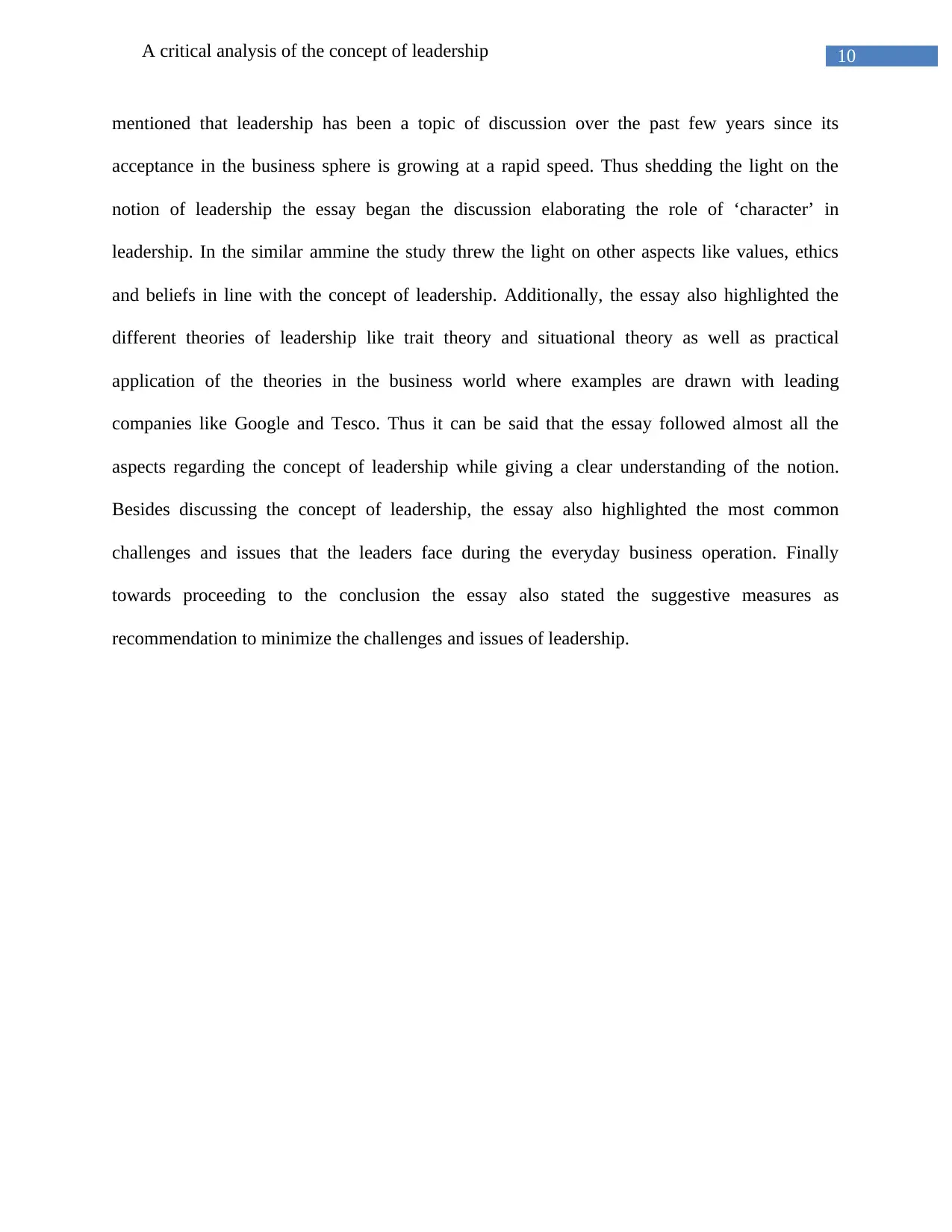
10A critical analysis of the concept of leadership
mentioned that leadership has been a topic of discussion over the past few years since its
acceptance in the business sphere is growing at a rapid speed. Thus shedding the light on the
notion of leadership the essay began the discussion elaborating the role of ‘character’ in
leadership. In the similar ammine the study threw the light on other aspects like values, ethics
and beliefs in line with the concept of leadership. Additionally, the essay also highlighted the
different theories of leadership like trait theory and situational theory as well as practical
application of the theories in the business world where examples are drawn with leading
companies like Google and Tesco. Thus it can be said that the essay followed almost all the
aspects regarding the concept of leadership while giving a clear understanding of the notion.
Besides discussing the concept of leadership, the essay also highlighted the most common
challenges and issues that the leaders face during the everyday business operation. Finally
towards proceeding to the conclusion the essay also stated the suggestive measures as
recommendation to minimize the challenges and issues of leadership.
mentioned that leadership has been a topic of discussion over the past few years since its
acceptance in the business sphere is growing at a rapid speed. Thus shedding the light on the
notion of leadership the essay began the discussion elaborating the role of ‘character’ in
leadership. In the similar ammine the study threw the light on other aspects like values, ethics
and beliefs in line with the concept of leadership. Additionally, the essay also highlighted the
different theories of leadership like trait theory and situational theory as well as practical
application of the theories in the business world where examples are drawn with leading
companies like Google and Tesco. Thus it can be said that the essay followed almost all the
aspects regarding the concept of leadership while giving a clear understanding of the notion.
Besides discussing the concept of leadership, the essay also highlighted the most common
challenges and issues that the leaders face during the everyday business operation. Finally
towards proceeding to the conclusion the essay also stated the suggestive measures as
recommendation to minimize the challenges and issues of leadership.
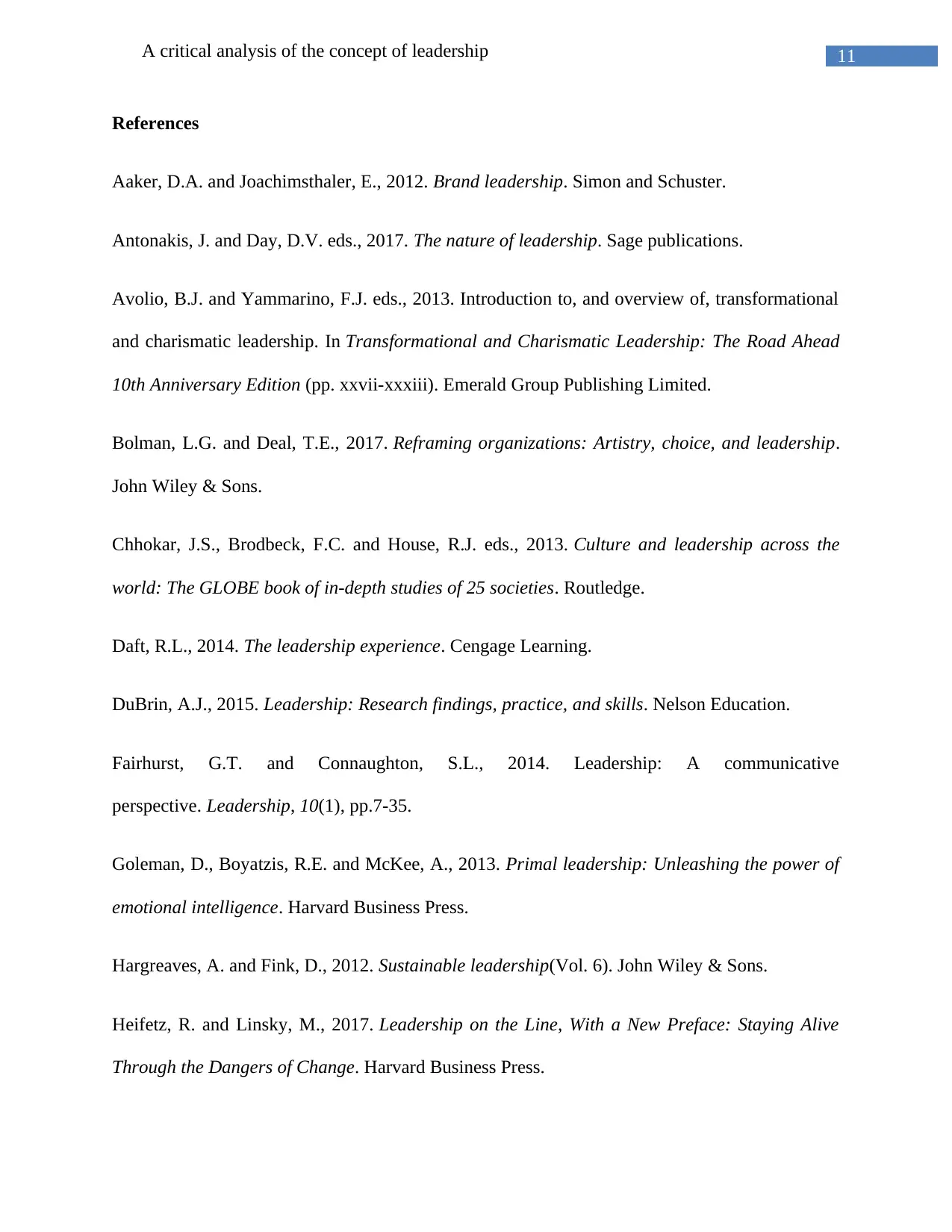
11A critical analysis of the concept of leadership
References
Aaker, D.A. and Joachimsthaler, E., 2012. Brand leadership. Simon and Schuster.
Antonakis, J. and Day, D.V. eds., 2017. The nature of leadership. Sage publications.
Avolio, B.J. and Yammarino, F.J. eds., 2013. Introduction to, and overview of, transformational
and charismatic leadership. In Transformational and Charismatic Leadership: The Road Ahead
10th Anniversary Edition (pp. xxvii-xxxiii). Emerald Group Publishing Limited.
Bolman, L.G. and Deal, T.E., 2017. Reframing organizations: Artistry, choice, and leadership.
John Wiley & Sons.
Chhokar, J.S., Brodbeck, F.C. and House, R.J. eds., 2013. Culture and leadership across the
world: The GLOBE book of in-depth studies of 25 societies. Routledge.
Daft, R.L., 2014. The leadership experience. Cengage Learning.
DuBrin, A.J., 2015. Leadership: Research findings, practice, and skills. Nelson Education.
Fairhurst, G.T. and Connaughton, S.L., 2014. Leadership: A communicative
perspective. Leadership, 10(1), pp.7-35.
Goleman, D., Boyatzis, R.E. and McKee, A., 2013. Primal leadership: Unleashing the power of
emotional intelligence. Harvard Business Press.
Hargreaves, A. and Fink, D., 2012. Sustainable leadership(Vol. 6). John Wiley & Sons.
Heifetz, R. and Linsky, M., 2017. Leadership on the Line, With a New Preface: Staying Alive
Through the Dangers of Change. Harvard Business Press.
References
Aaker, D.A. and Joachimsthaler, E., 2012. Brand leadership. Simon and Schuster.
Antonakis, J. and Day, D.V. eds., 2017. The nature of leadership. Sage publications.
Avolio, B.J. and Yammarino, F.J. eds., 2013. Introduction to, and overview of, transformational
and charismatic leadership. In Transformational and Charismatic Leadership: The Road Ahead
10th Anniversary Edition (pp. xxvii-xxxiii). Emerald Group Publishing Limited.
Bolman, L.G. and Deal, T.E., 2017. Reframing organizations: Artistry, choice, and leadership.
John Wiley & Sons.
Chhokar, J.S., Brodbeck, F.C. and House, R.J. eds., 2013. Culture and leadership across the
world: The GLOBE book of in-depth studies of 25 societies. Routledge.
Daft, R.L., 2014. The leadership experience. Cengage Learning.
DuBrin, A.J., 2015. Leadership: Research findings, practice, and skills. Nelson Education.
Fairhurst, G.T. and Connaughton, S.L., 2014. Leadership: A communicative
perspective. Leadership, 10(1), pp.7-35.
Goleman, D., Boyatzis, R.E. and McKee, A., 2013. Primal leadership: Unleashing the power of
emotional intelligence. Harvard Business Press.
Hargreaves, A. and Fink, D., 2012. Sustainable leadership(Vol. 6). John Wiley & Sons.
Heifetz, R. and Linsky, M., 2017. Leadership on the Line, With a New Preface: Staying Alive
Through the Dangers of Change. Harvard Business Press.
⊘ This is a preview!⊘
Do you want full access?
Subscribe today to unlock all pages.

Trusted by 1+ million students worldwide
1 out of 13
Related Documents
Your All-in-One AI-Powered Toolkit for Academic Success.
+13062052269
info@desklib.com
Available 24*7 on WhatsApp / Email
![[object Object]](/_next/static/media/star-bottom.7253800d.svg)
Unlock your academic potential
Copyright © 2020–2026 A2Z Services. All Rights Reserved. Developed and managed by ZUCOL.




